The internet is a wonderful place that is completely open and safe for browsing without any protection, especially in late 2018, right? After all, technology and regulations must be advanced enough by now so that our browsing experiences are protected at all times. Nothing bad can happen if you click on that random link that promises tons of money with no effort at all, correct?
Well, actually, no.
In fact, the current situation is nearly entirely opposite of what you would imagine.
Hacking attacks are coming in swarms, governments and their agencies are spying on their citizens (when they are not blocking online content), and even our own ISPs, those wonderful firms that have gifted us with the magical land of the world wide web, are recording our information and selling it for profit.
And, let’s not forget advertisers who are buying that data in order to know what you need, even before you do yourself.
With a situation like that, whatever will we do to protect ourselves?
Well, luckily, someone has already asked that question, a long time ago. Since then, they also managed to come to a solution, and it lies in the VPN technology.
I know what you’re thinking: this is probably some high-tech mumbo-jumbo that only hackers themselves can understand.
If that was your train of thought, fortunately for you, it was not correct. VPN is actually pretty easy to use, and most of the time, it all comes down to a click of a button.
You see, VPNs have been around for a while, and it was only recently that they became popular after people became aware of ever-increasing cases of hacking attacks, data monitoring, and other things I mentioned before. In the long years that VPNs existed as tools used by a few who knew what dangers lurk beneath the surface of the web, security experts worked on them, making them better, more advanced, as well as user-friendly.
What are VPNs and what can they do?
Let’s start from the beginning. VPN stands for “Virtual Private Network,” and they are special programs used for protecting user online information. So far so good, right? Good.
When you use the internet, there is a certain amount of traffic that goes between your computer, phone, tablet, and other devices and the web itself. Websites that you visit are collecting your data in exchange for providing you with theirs, and it all works like a transaction in any shop.
However, this data is not safe, as third parties (hackers, governments, etc.) can monitor it. VPNs use protection protocols to create a secure tunnel around your data stream, which results in shielding it from curious eyes, and even encrypting it, so that nobody can read it even if they obtained it somehow.
This is what online privacy is all about, and what VPNs can accomplish just by sitting there, activated on your devices.
Become anonymous with VPN
In addition, they can provide users with anonymity as well. How, you ask? That is simple to understand too. When you use the internet, you are assigned your own, personal IP address. You have probably heard of it already, maybe even seen it. It looks like a bunch of numbers separated by dots after every few digits.
Well, these addresses are capable of recording all of your actions, and assigning them to you. They are provided by your ISP, which records everything you do on their servers. This is where VPNs come in. They have their own servers, in numerous countries around the world.
All you need to do is pick which one you want to connect with (there is a conveniently placed list in a VPN interface), and that’s it. You will be assigned a new IP, which will still record data, but nobody will know that it belongs to you.
Best of all, you can use it for accessing the content that your country has decided to block, as your very location is now believed to be in the country where the server is installed. This also conveniently allows you to access foreign content that is blocked to the rest of the world.
In conclusion, VPN is a simple-to-use technology that can prevent a lot of headaches for you and your family.
Hackers can’t get to you if they can’t get to your data, right?
Think of VPNs as shields against all the bad that exists out there on the web. And, if you think that such levels of protection are not necessary, just check the news and see how many thousands or millions of people were affected by the newest hacking attack.
The sad reality is that the internet is nowhere close to being safe these days, which is why you need to take matters into your own hands if you want to secure your privacy and anonymity. If you don’t do it, rest assured that nobody else will.














